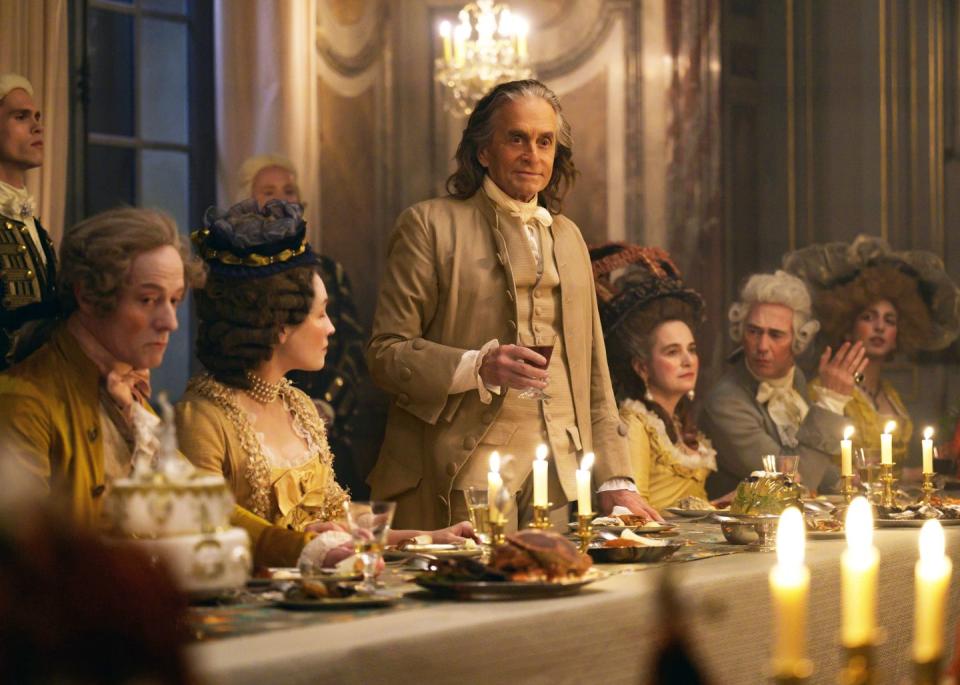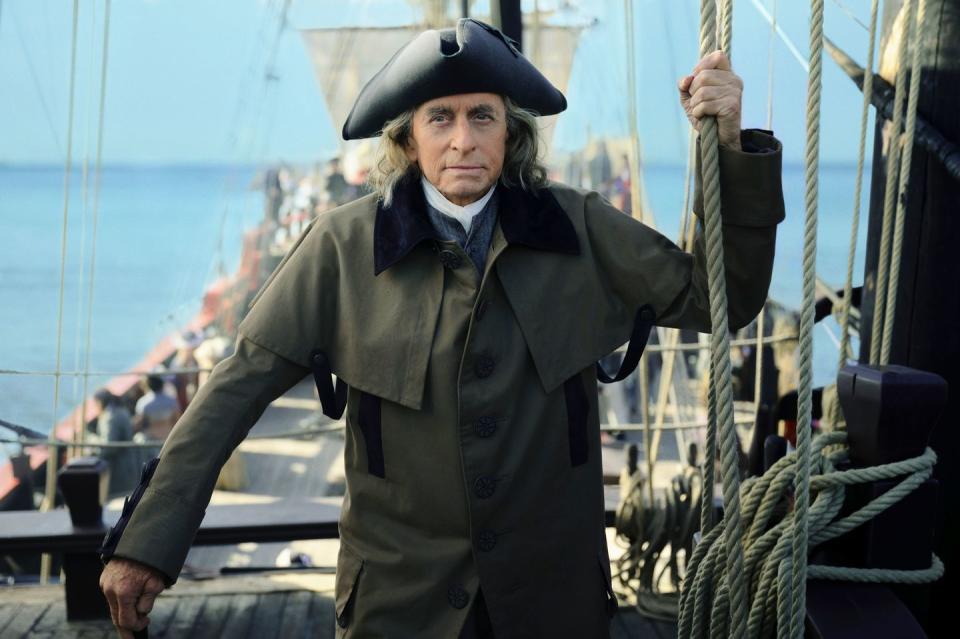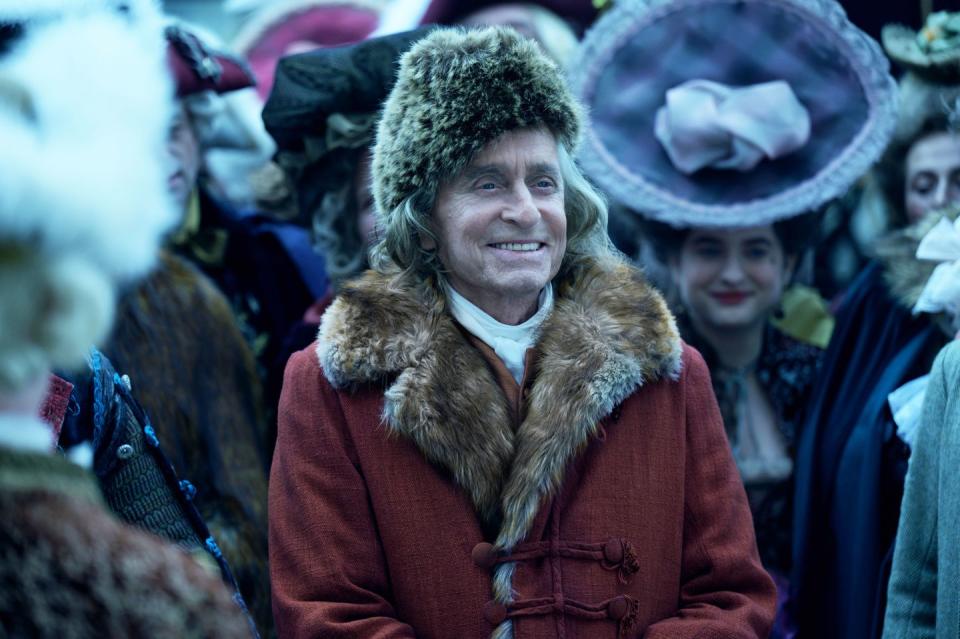Michael Douglas Has a Firm ‘No Dickheads’ Policy
- Oops!Something went wrong.Please try again later.
- Oops!Something went wrong.Please try again later.
"Hearst Magazines and Yahoo may earn commission or revenue on some items through these links."
ROUGHLY 13 MINUTES into Franklin—the Apple TV+ miniseries from John Adams writer Kirk Ellis—the titular character, played by the legendary Michael Douglas, lets out a fart. What happens immediately after is more remarkable than what’s just proceeded it, as the 70-year-old founding father, tasked with getting the French to underwrite the American play for democracy, leans back in his chair and definitely declares, “It’s remarkable how one’s outlook is improved by the passing of wind.”
To make things even more interesting, the idea for the moment of flatulence came directly from Douglas himself.
“I'm embarrassed to say that I added that,” the 79-year-old Oscar-winning star tells Men’s Health with a wry smile. “I did. I'm sorry if it [takes] everybody out of the scene, but for the amount of time that we spend with him, knowing his health issues, I thought it would be uncouth to do eight hours and not fart once.”

A fair point indeed. Franklin, which also counts Douglas as a producer, focuses on parts of the legendary historical figure’s life that everyone knows about—his brilliance as a diplomat—but also hones in on aspects that don’t get nearly as much press, including the running theme of aging, and the health difficulties that anyone, including men you've read about in history books, could face as they get older (even while working to establish an America itself moving towards infancy).

A Great Improvisation: Franklin, France, and the Birth of America
amazon.com
$16.99
For as committed as Douglas was to telling the story the right way, though, he wasn’t exactly cutting the cheese on set in front of the cast and crew: “It was ADR,” he makes sure to clarify. “No, I don’t go that far.”
Helmed by stalwart director Tim Van Patten, Franklin is the kind of stately mini-series you’d anticipate from the same creative of John Adams. Based on Stacy Schiff’s Pulitzer Prize winner book A Great Improvisation: Franklin, France, and the Birth of America, it’s a history buff’s dream—steeped in detail, endlessly engrossing, and captures an urgency surrounding the period. Anchored by Douglas’s captivating performance, the series will pair well with another historical mini-series currently gracing television screens.
Ahead of Franklin’s release, Men’s Health sat down with Douglas to talk about his love of history, his “no dickheads rule,” and what he’s learned from the late-stage part of his career.
MEN'S HEALTH: Can you tell us how you get involved with Franklin?
Michael Douglas: I will! Although, I don't know if I see Ben Franklin on the cover of Men's Health.
[Both laugh.]
MD: It was submitted to me by one of the producers, Richard Plepler, who I'd worked with on Behind the Candelabra, the Liberace story, when he was at HBO. He's a very, very talented, tasteful guy. He brought me the first hour of this series, and told me Tim Van Patten—who I admire as a director—was involved, and Noah Jupe, who I knew his work. I've never done a period picture. So, at a point in my life where I'm trying different things, I thought this would be fun. Not to mention, eight months in Paris can't be terrible. It was the whole combination.

As I got into it, I saw a lot of analogies to what's going on today. I got a brand new appreciation for democracy and realizing how close we came to losing it. Ben Franklin went over to France six, seven weeks after we signed the Declaration of Independence. And that was based on the fact that we didn't have any money, the army was in tatters, Washington was struggling, and we desperately needed funds. So [they] decided, and chose to send Franklin over to France, one of the oldest monarchies in the world, to try to get the money to support the country, which was a yeoman's task. It made me realize that without the help of France at that point, we would not have an America. It wouldn't be there. These are all true stories, and are the kinds of dramatic arcs you love to see in any script—especially when they happen to be true.
MH: Are you naturally a history buff?
MD: I'm politically involved. I mean, I read a lot; I'm a news junkie. One of my sons, Dylan, is a history major and was actually a big asset for this because he's got vast knowledge and understood the story well. Part of me thought that if I had one person who was interested, and it was my son, it was a good reason to do it.
MH: How did that come together? Was he was he on set giving you pointers? Or was he a sounding board?
MD: He helped me fill out the time [period], what was really going on, understand where the army was at that point in the war, how bad things were going, what a wild gamble it was that [Franklin] took to go over there. Stacey Schiff's book calls it "the great improvisation"—he didn't know what the hell he was gonna do. He just had to figure it out, using his skills—diplomacy, seduction, and flattery—to get what he wanted.
MH: Is there a moment in your career you've felt was a similar great improvisation, something you took a big risk on that you weren't quite sure whether or not it was going to pan out?
MD: Most of the things I've worked on have been kind of a risk [Laughs]. I've never been one to think about the audience, or who's it for? I've always done things because you need the passion for yourself to make it all go and believe in it. I always felt that if you execute well, there will be an audience.
I mean, I've been in a lot of situations, in production, where I shook my head and said, "How am I going to get out of this?" Yes, that has happened.
MH: Does your approach to creating a character change when you're playing someone rooted in history?
MD: Well, this was my first period piece, right? I've never done a historical piece. There were a lot of decisions to make. One of them was Are you going to try to recreate a look of Benjamin Franklin? Like totally? Are you going to put on the appliances, the fat suit and this and that? Besides the amount of time that would have taken—the amount of production time taken out of each day, two and a half hours of makeup, getting it off, all of that—I thought for an eight-hour miniseries, the audience wants to be with somebody they know, who they can recognize. So we did our own suggestion to the Franklin look.

I was nervous about it, whether it was going to fly or not for an audience. The response we've be getting, so far, has been really good. I'm happy we did it that way—it saved me a lot of hours.
MH: You’ve spoken in the past about how a show like The Kominsky Method allowed you to look at getting older in a more comedic way. Franklin is about the wisdom, value, and experience that comes with being older and having such a full life. Is that part of what drew you to the show?
MD: No, but I'm gonna steal that, because that's really good—I'm going to use that. It's just a combination of not having ever done a period picture, the honor of portraying somebody like Benjamin Franklin, and then ultimately—since it always feels like a bit of a risk—the joy of seeing it, and how proud [you are of] how it all turned out.
MH: At the end of the first episode, Franklin has a comment where he basically says, “What use is experience if we can't learn from it?” What have you learned from the experiences in the later portion of your career?
MD: It's still pretty basic to me: it's the material. I worry that too often people, they might have a good idea, but the actual structural ability to break it into three acts or whatever it may be, is lost sometimes. I just worry about the material. In your career, you may have three or four really great parts. Wall Street, I had a great part. Most of the time, you're dealing with relatively mediocre material, and then you just need to make it as good as it can get.
The message, for me, is really good material and working with good people. And no dickheads! Alright? No dickheads. It puts too much stress on everything. You want to work with positive, good people.
MH: I've heard you mention that before—I think that's a good rule in general.
MD: It is, no matter what. Whether you're getting married or anything else.
MH: One last thing—you're a noted fan of the New York Jets, and so is my editor, so I wanted to ask on on his behalf: Would you prefer a Jets Super Bowl, or another Oscar?
MD: Oh, man... I'm going for the Oscar. Forget it. How about just give me the Jets in the playoffs? I just want the Jets in the playoffs.
This interview was condensed for content and clarity.
You Might Also Like

